Introduction
William Shakespeare, the “Bard of Avon,” is a towering literary figure. His plays and sonnets have captivated audiences for centuries with their timeless themes, eloquent language, and unforgettable characters. From iconic tragedies like Hamlet and Romeo and Juliet, to beloved comedies like A Midsummer Night’s Dream, Shakespeare’s genius continues to inspire. Let’s dive into some truly fascinating facts about his life and work.
15 Fascinating Facts About Shakespeare(One Line Facts)
- Shakespeare was born and died on the same probable date.
- We don’t know exactly when his plays were written.
- He introduced thousands of new words to the English language.
- Shakespeare may not have written all his plays alone.
- Queen Elizabeth I was a fan of his plays.
- His original Globe Theatre burned down during a performance.
- There are conspiracy theories about the true authorship of his works.
- Shakespeare was likely a savvy businessman.
- He wasn’t considered extraordinary in his own lifetime.
- Shakespeare had a mysterious period known as the “Lost Years.”
- His works contain some of the most famous quotations in history.
- Shakespeare’s plays have been translated into over 80 languages.
- He was both an actor and a playwright.
- Shakespeare’s will famously left his wife the “second-best bed.”
- There’s a curse on his grave.
Fact 1: Shakespeare was born and died on the same probable date.
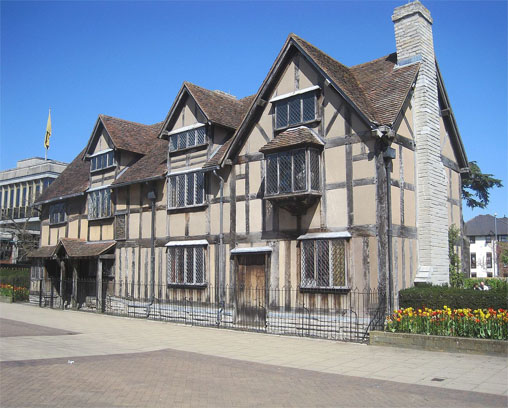
Image source: wikipedia
While we don’t have an exact birth record, Shakespeare was baptized on April 26th, 1564, in Stratford-upon-Avon. Baptisms traditionally happened three days after birth, suggesting he may have been born on April 23rd. Intriguingly, he is recorded as having died on April 23rd, 1616. This coincidence adds a touch of poetic symmetry to the life of the world’s greatest dramatist.
Fact 2: We don’t know exactly when his plays were written.
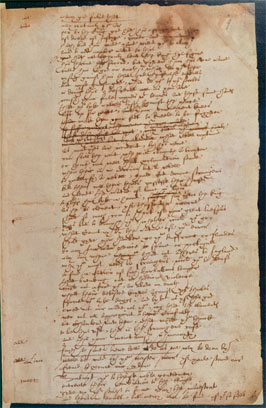
Unlike modern playwrights, Shakespeare didn’t meticulously date his works. Scholars rely on mentions of the plays in historical records, publishing details, and stylistic analysis to approximate when they might have been composed. This leaves some room for debate and adds to the mystery surrounding their creation.
Fact 3: He introduced thousands of new words to the English language.

Shakespeare’s creativity extended far beyond storytelling. He was a master wordsmith, inventing or popularizing an estimated 1,700 words still in use today. Words like “lonely,” “fashionable,” “addiction,” “swagger,” and “bedazzled” first appeared in his plays and sonnets. His linguistic innovation enriched the English language and gives us countless tools for expression centuries later. He cleverly combined existing words, adapted foreign terms, and sometimes, simply made up new vocabulary to suit his dramatic purposes.
Fact 4: Shakespeare may not have written all his plays alone.
![Shakspeare [sic] performing before Queen Elizabeth and her court](https://top15facts.com/wp-content/uploads/2024/02/Shakespeare-may-not-have-written-all-his-plays-alone.jpg)
Image Source: Library of Congress
While Shakespeare is the undisputed star of Elizabethan drama, some scholars believe he might have collaborated with other playwrights. This was common practice at the time. Plays like Henry VI and Pericles show stylistic inconsistencies that suggest another hand in their creation. Some possible collaborators include Christopher Marlowe and Thomas Middleton. Debate continues, but the idea of collaboration adds a fascinating layer to our understanding of how his plays may have evolved.
Fact 5: Queen Elizabeth I was a fan of his plays.
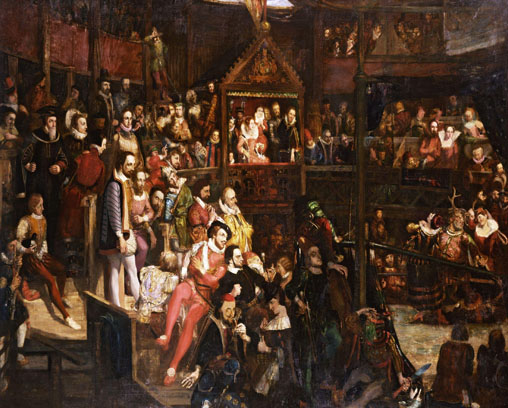
©Victoria and Albert Museum, London
Shakespeare’s acting company, the Lord Chamberlain’s Men (later the King’s Men), enjoyed royal patronage. Queen Elizabeth I enjoyed theater and Shakespeare’s plays, in particular, were often performed at court. His work likely resonated with her due to its wit, exploration of power, and understanding of human psychology. Royal favor granted Shakespeare’s company prestige and financial stability, allowing them to flourish.
Fact 6: His original Globe Theatre burned down during a performance.
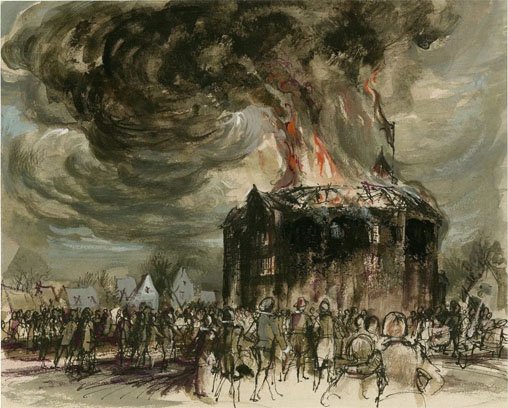
The iconic Globe Theatre, where many of Shakespeare’s plays were first performed, met a fiery end in 1613. During a performance of Henry VIII, a stage cannon misfired, setting the thatched roof alight. Within about an hour, the wooden theater burned to the ground. Luckily, there were no recorded fatalities. The Globe was quickly rebuilt, demonstrating the enduring popularity of Shakespeare’s work and the power of theater in his time.
Fact 7: There are conspiracy theories about the true authorship of his works.
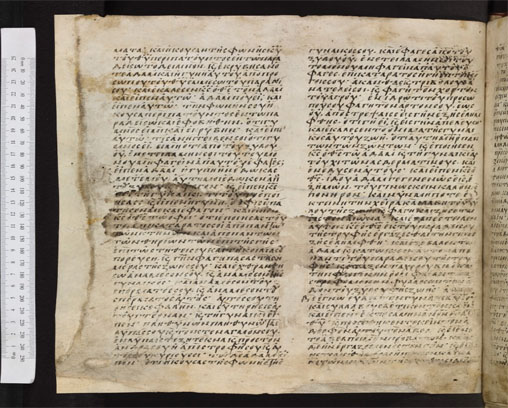
Doubts about whether William Shakespeare of Stratford-upon-Avon truly authored the works attributed to him have persisted for centuries. Some argue that his relatively modest education was incompatible with the genius reflected in the plays. Proposed alternative authors include Francis Bacon, Christopher Marlowe, and even Edward de Vere, the Earl of Oxford. However, most reputable scholars maintain that the evidence overwhelmingly supports Shakespeare’s authorship. This debate offers a fascinating window into the enduring allure of Shakespeare and his works.
Fact 8: Shakespeare was likely a savvy businessman.
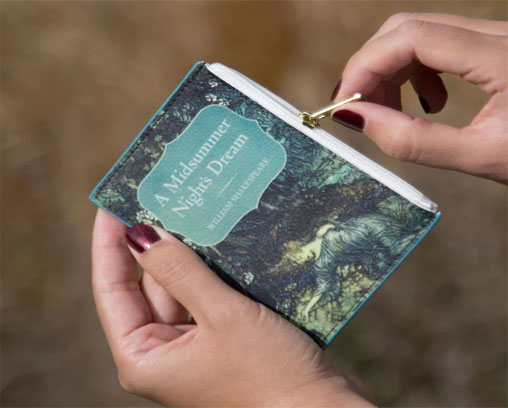
Image Source: wellreadcompany
Shakespeare wasn’t merely an artistic genius; he possessed a keen business sense. In addition to income from his plays and acting, he profited from investments in the Globe Theatre and real estate holdings in Stratford-upon-Avon. He retired a wealthy man, demonstrating that literary talent can be paired with financial acumen.
Fact 9: He wasn’t considered extraordinary in his own lifetime.

While Shakespeare is now revered as the greatest English writer, he wasn’t always so celebrated. During his lifetime, he was a successful playwright and actor, but he wasn’t necessarily singled out as a unique literary genius. Other playwrights, like Ben Jonson, were equally – if not more – renowned at the time. It’s only in the centuries after his death that Shakespeare’s reputation reached its current heights. This shows how literary reputations change over time and highlights that critical praise isn’t always immediate.
Read More: Decoding the Da Vinci Code: 15 Facts vs. Fiction Unveiled
Fact 10: Shakespeare had a mysterious period known as the “Lost Years.”

Image Source: qudosacademy
Between approximately 1585 and 1592, very little is known about Shakespeare’s life. These are the so-called “Lost Years.” Historians lack documentation for what he did during this time. Speculations range from him working as a schoolteacher or traveling abroad to more outlandish theories of secret missions for the government. The “Lost Years” add to the mystique surrounding Shakespeare, leaving room for scholarly debate and imaginative speculation.
Fact 11: His works contain some of the most famous quotations in history.

Image Source: thenegotiationclubs
Shakespeare’s plays are a treasure trove of memorable lines that have entered everyday language. Phrases like “To be or not to be” (Hamlet), “All the world’s a stage” (As You Like It), “Love is blind” (The Merchant of Venice), and countless others show his mastery of language and profound understanding of human nature. His quotability makes him accessible even to those unfamiliar with the full plays.
Fact 12: Shakespeare’s plays have been translated into over 80 languages.

The universality of Shakespeare’s work is evident in its global reach. His plays and poetry have been translated into over 80 languages, allowing audiences worldwide to experience his genius in their own tongues. This remarkable translation history speaks to the enduring power of his stories and their ability to transcend linguistic and cultural barriers.
Read More: 15 Astonishing Van Gogh Facts You Didn’t Know
Fact 13: He was both an actor and a playwright.
Shakespeare wasn’t merely a distant writer – he was an active participant in the theatrical world. Though records are sparse, he’s believed to have performed with his acting company, primarily in smaller roles. This first-hand experience on stage likely shaped the dramatic effectiveness of his plays, as he would have an intuitive understanding of what worked for actors and audiences.
Fact 14: Shakespeare’s will famously left his wife the “second-best bed.”
This peculiar detail in Shakespeare’s will has sparked endless speculation. Some view it as an insult to his wife, Anne Hathaway. Others argue that their primary bed may have been a symbolic marital bed, and the “second-best bed” the one they actually used. Whatever the real intention, it adds an intriguing biographical note to Shakespeare’s story.
Read More: 15 Surprising Renaissance Facts You Won’t Believe Are True
Fact 15: There’s a curse on his grave.

Shakespeare’s tombstone in the Holy Trinity Church in Stratford-upon-Avon bears an inscription warning against disturbing his remains: “Good friend for Jesus sake forbear, To dig the dust enclosed here. Blessed be the man that spares these stones, And cursed be he that moves my bones.” This curse may have been meant to prevent the common practice then of exhuming remains to make room in crowded churchyards.
Conclusion
Shakespeare remains as intriguing a figure as the characters he created. His legacy continues to shape theater, literature, and the very language we speak. Whether exploring his plays, visiting his Stratford-upon-Avon home, or simply pondering the mysteries surrounding his life, the Bard’s influence remains undeniable.
15 frequently asked questions about Shakespeare
-
What are Shakespeare’s most famous plays?
Shakespeare’s iconic works include tragedies like Hamlet, Romeo and Juliet, Macbeth, and King Lear. He also wrote beloved comedies like A Midsummer Night’s Dream, Much Ado About Nothing, and The Taming of the Shrew, and historical dramas such as the Henry plays.
-
Where was Shakespeare born?
Shakespeare was born in Stratford-upon-Avon, a market town in Warwickshire, England. You can still visit his birthplace and explore the beautiful town where he grew up.
-
Did Shakespeare have any siblings?
Yes, Shakespeare had several siblings. He was the third of eight children born to John Shakespeare and Mary Arden. Though some of his siblings died in childhood, he had a close relationship with his younger brother, Gilbert.
-
What are some common themes in Shakespeare’s plays?
Shakespeare’s plays explore universal themes that resonate across time. These include love, ambition, jealousy, revenge, fate, power, identity, and the complexities of the human condition.
-
Is Shakespeare difficult to understand?
The Early Modern English of Shakespeare’s time differs from our language. But with some effort, anyone can appreciate his works! Using translations, annotated editions, or watching performances can help unlock the beauty and meaning of his language.
-
Why do we still study Shakespeare?
We study Shakespeare because his work offers timeless insights into human behavior. His plays are rich in language, explore complex characters, and grapple with enduring questions that continue to challenge and inspire us.
-
Did Shakespeare invent any words?
Yes! Shakespeare is credited with introducing hundreds of words into the English language, including “lonely,” “fashionable,” “critical,” and “eyeball.” His plays demonstrate his remarkable creativity and linguistic mastery.
-
What was the Globe Theatre?
The Globe Theatre was an open-air playhouse in London where many of Shakespeare’s plays were first performed. His acting company, the Lord Chamberlain’s Men (later the King’s Men), were part-owners of this iconic theater.
-
Are there any films based on Shakespeare’s plays?
Absolutely! Shakespeare’s works have been adapted countless times for the screen, from classic interpretations to modern reimaginings. Some famous examples include “Hamlet” (1948), “Romeo + Juliet” (1996), and “10 Things I Hate About You” (1999, based on The Taming of the Shrew).
-
Did Shakespeare really write all his plays?
While the vast majority of scholars believe Shakespeare wrote the works attributed to him, there are alternative authorship theories. Some argue his modest background doesn’t align with the genius in his plays, suggesting figures like Christopher Marlowe or Francis Bacon were the true authors. However, evidence overwhelmingly supports Shakespeare’s authorship.
-
Did women act in Shakespeare’s time?
No, all roles in Shakespeare’s plays were performed by men and young boys. Women weren’t allowed on the professional stage in England during his lifetime. This meant that iconic female characters like Juliet, Ophelia, and Lady Macbeth were all originally played by males.
-
What does “To be, or not to be” mean?
This famous line from Hamlet reflects the character’s contemplation of suicide. He’s weighing the pain of existence against the unknown of death. The phrase has become synonymous with existential questions about life and mortality.
-
Where can I see Shakespeare performed live?
Shakespeare’s plays are produced all over the world! Check your local theaters for productions. Cities often have dedicated Shakespeare festivals. Plus, a reconstructed Globe Theatre in London offers an experience close to how audiences would have enjoyed his plays centuries ago.
-
Are there any good resources for learning more about Shakespeare?
Many resources are available! Websites like SparkNotes and NoSweatShakespeare offer summaries, translations, and analysis. Libraries and bookstores carry countless books exploring Shakespeare’s life and works. Many documentaries and videos also provide fascinating insights.
-
Did Shakespeare have a wife and children?
Yes, Shakespeare married Anne Hathaway in 1582. They had three children: Susanna, and twins Hamnet and Judith. Sadly, his son Hamnet died in childhood at age 11.




